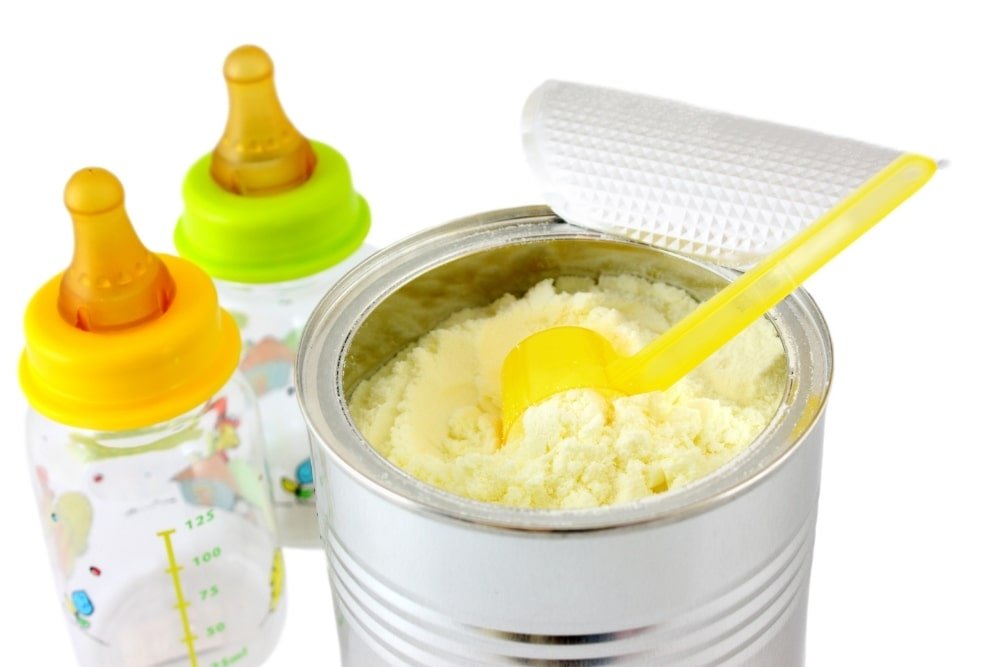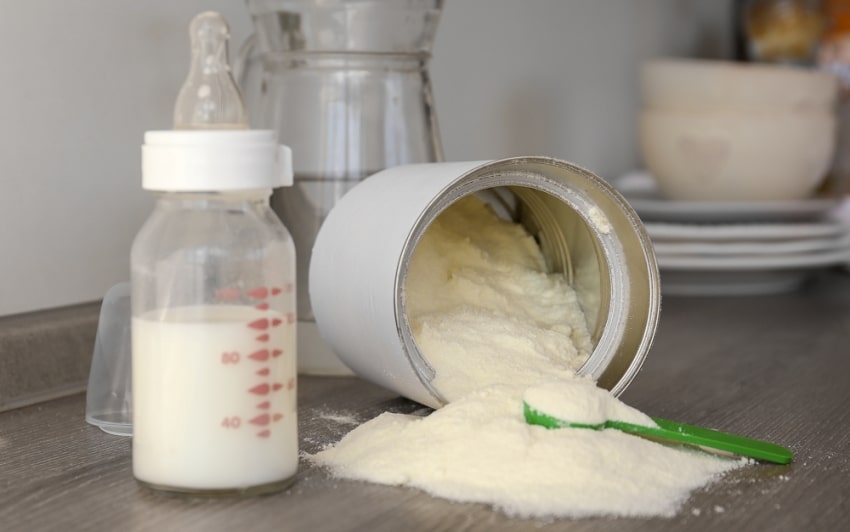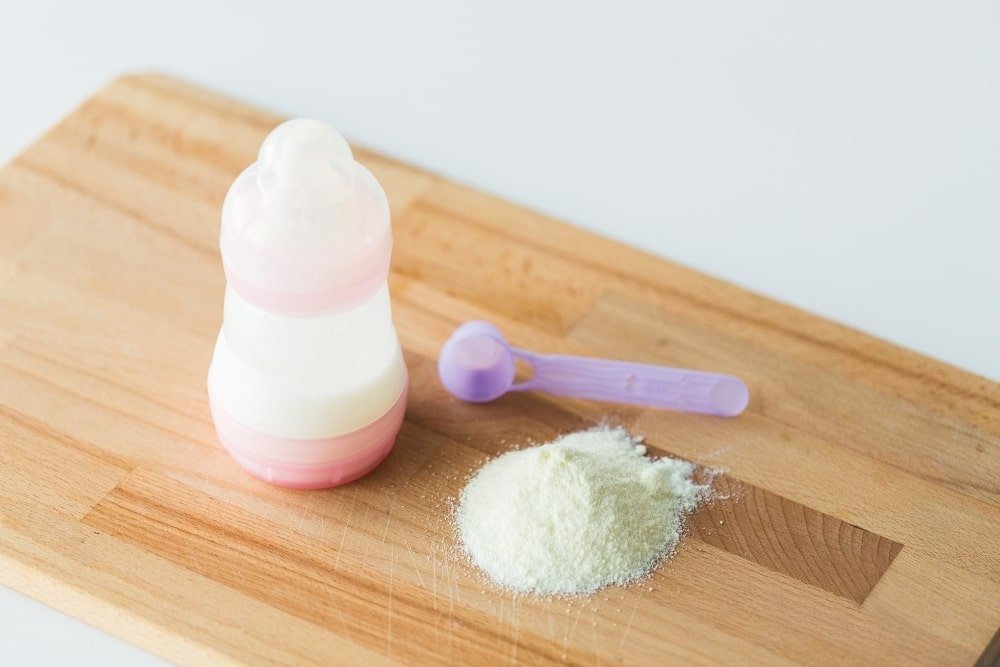If you are bottle-feeding your baby, you have probably noticed that formula milk is quite expensive. There are several different formula companies to choose from but the truth is, none of them offer milk that is affordable to families on a really tight budget.
You may be wondering does insurance cover baby formula to help you with the costs of feeding your baby and the quick answer is it will depend on what insurance company you use and whether your baby has any health conditions.
Insurance companies do not cover formula milk in the majority of cases. There is no federal requirement for insurance companies to cover baby formula milk.
However, 17 states mandate that insurance companies cover the elemental formula for babies with certain health conditions. So it is only possible to get insurance to cover formula milk that is needed for medical purposes.
If your baby’s formula is not deemed as being medically necessary, your insurance will not cover it. It’s important to note that not all insurance companies will cover formula milk, even when your baby has a health condition meaning they can’t be fed standard formula.
In this article
- Does Insurance Cover Formula?
- Can You Get A Prescription For Formula?
- How Do I Get My Insurance To Cover Special Formula
- Does Insurance Cover Alimentum Formula?
- Does Medicaid Cover Formula?
- Will Blue Cross Shield Cover Baby Formula?
- Does United Health Care Cover Formula?
- Does AETNA Cover Baby Formula?
- What To Do If I Can’t Afford Formula
- FAQs
- The Final Thought
Does Insurance Cover Formula?
When it comes to feeding your baby, breastfeeding is by far the cheapest option. Despite being substantially more expensive, many moms choose bottle-feeding over breastfeeding.
There are many reasons why moms decide to bottlefeed their baby rather than breastfeed:
- Some women simply can not breastfeed and there are many reasons as to why.
- Some choose formula as they are returning to work not long after giving birth.
- Convenience and the ability to let someone else take over feeding so they can have a break.
- Many women simply do not want to breastfeed and this is their decision to make.
Formula milk can be expensive and the price tag is sometimes too large for families on a tight budget. It is not surprising that many formula-feeding parents wonder if they can get their insurance to cover the cost of their baby formula.
Statistics show parents spend between $1200 – $2000 on formula milk in their baby’s first year. That is a lot of money, especially if you are not in a good place financially.
So, does insurance cover baby formula?
View in gallery
Unfortunately, in the majority of cases, insurance companies will not cover baby formula. There are no federal laws requiring insurance companies to cover the cost of formula, even for families who are struggling to pay for it themselves.
If you want your insurance to cover standard formula milk for your baby, we are sorry to be the bearer of bad news but it is not going to happen.
Standard baby formula milk is considered to be a food product, not a medicine, therefore it is not going to be covered under your health insurance policy.
However, if your baby has a medical condition that requires them to have specialized milk, you may be able to get it covered by your insurance.
Seventeen states in the US mandate that insurance companies cover the specialized elemental formula for babies with certain health conditions or food allergies.
The laws vary from state to state and even with this mandate, it can still be difficult to get formula milk costs covered by insurance.
Here is a list of the states that currently mandate insurance companies cover formula milk for medical purposes:
- Arizona
- Connecticut
- Illinois
- Maine
- Maryland
- Massachusetts
- Minnesota
- Nebraska
- New Hampshire
- New Jersey
- New York
- Oregon
- Pennsylvania
- Rhode Island
- South Dakota
- Texas
- Washington
Can You Get A Prescription For Formula?
If you are looking to get your insurance company to cover the costs of formula for your baby, you are going to need to get specialized milk prescribed by a pediatrician.
If your baby has a food allergy or certain gastric conditions which prevent them from being able to consume standard formula, you may be able to get specialized milk prescribed.
The most common reason for a pediatrician to prescribe specialized formula milk is a dairy allergy meaning that babies who are allergic to dairy cannot drink standard formula milk.
View in gallery
Some formula companies do sell dairy-free alternatives of their standard formula but babies can sometimes be allergic to ingredients used in these kinds of milk too.
There are also certain gastric conditions and diseases that will require your baby to drink specialized formula. If your baby has any of the following conditions, you may be able to get a prescription for specialized baby formula:
- Crohn’s disease
- Cystic Fibrosis
- Malabsorption
- Ulcerative colitis
- Gastroesophageal reflux
The qualifying health conditions can vary between insurance companies and in almost all claims your insurance provider will need to see medical documentation and proof that there is a medical reason why your baby can’t drink standard formula.
How Do I Get My Insurance To Cover Special Formula
Baby formula is expensive and the dairy-free and specialist formula milk is even more pricey. It is no wonder that many parents try to get their formula milk covered by their insurance company.
If you are going to try and see if you can get your baby’s formula covered on your insurance, here are three important steps you need to take:
Get a prescription
If you want your insurance to cover the cost of baby formula, you are going to need to get a prescription. This shouldn’t be too difficult if your baby has an allergy or health condition that means they can’t drink standard formula.
When your baby is diagnosed with an allergy or other condition, ask your pediatrician to write you a prescription for the specialized formula milk they need. Without a prescription, your chances of getting the formula covered by health insurance are practically zero.
Ask for a letter of medical necessity
Ask your pediatrician, gastroenterologist, or allergist to write a letter stating the medical necessity for your baby to have a prescription formula.
The letter should include justification for the formula, including but not limited to your child’s growth chart, progress, diagnosis, labs, and any other pertinent information your physician sees fit.
He should also stress the cost-effectiveness of nutrition management and the cost that will arise if your child is unable to access this formula.
Be persistent and appeal if necessary
Call and write to your health insurance provider as much as possible. Fill in all the forms carefully and provide all of the required documentation needed to your insurance company.
View in gallery
If you are getting nowhere when phoning customer service, ask to be put through to a caseworker who can talk you through your policy in more detail.
In the event that your claim for formula costs to be covered is rejected, be persistent and appeal your case.
If your baby needs a specialized formula for medical reasons and you are struggling to pay for it yourself, be persistent and continue to appeal.
As we stated earlier, there is no federal requirement for insurance companies to cover the cost of formula milk for your baby.
However, it is always worth enquiring with them as they may cover the costs of your baby’s needs like a special formula due to an allergy or health condition.
Does Insurance Cover Alimentum Formula?
If your baby has a cow’s milk allergy, they are likely to experience allergy symptoms when drinking standard baby formula.
However, there is hypoallergenic formula milk available to buy in the store that is suitable for babies with allergies. Similac Alimentum is a well-known baby formula used by parents of babies with certain food allergies.
Similac Alimentum is a nutritionally complete, hypoallergenic formula and can help to ease the symptoms of colic as well as being safe for babies with allergies to drink.
Alimentum can be almost three times more expensive than standard baby formula and many parents would benefit from their health insurance covering the costs.
Prices pulled from the Amazon Product Advertising API on:
Product prices and availability are accurate as of the date/time indicated and are subject to change. Any price and availability information displayed on [relevant Amazon Site(s), as applicable] at the time of purchase will apply to the purchase of this product.
If your baby needs to be fed Alimentum for a diagnosed medical condition or allergy, you may be able to get your insurance to cover the cost of the hypoallergenic formula.
You will need to have a prescription for Alimentum or medical documentation from your baby’s physician stating that the formula is medically necessary.
As insurance companies do cover the cost of formula in some circumstances, you may be in luck and they may cover the cost of Alimentum for your baby.
If you are not sure what your insurance company offers, it is always worth giving them a call and asking for the details of your policy.
Does Medicaid Cover Formula?
Medicaid is a federal and state program that helps with healthcare costs for people with limited income and resources – but does Medicaid cover formula milk too?
You may be able to get your baby’s formula milk covered by Medicaid but it is extremely unlikely they will cover the costs of a standard formula.
The regulations and mandates for Medicaid vary between states and what the insurance covers in one state won’t necessarily be the same as what it covers in another.
You can try to get the Medicaid program to cover baby formula but, as previously discussed, you will need a prescription or medical documentation explaining your baby’s diagnosis and medical need for specialized formula milk.
If you qualify for Medicaid you may also be eligible for the WIC (Women Infant and Children) benefits program. The WIC will help to cover the cost of baby formula for families on a low income.
Will Blue Cross Shield Cover Baby Formula?
Blue Cross Shield Association is a federation of 35 separate health insurance companies that provide health insurance to millions of people in the US.
In some cases, Blue Cross Shield will cover the cost of baby formula needed for medical purposes. Here is a list of diseases and illnesses that may enable your baby to have their specialized formula covered by Blue Cross Shield:
- Tyrosinemia
- Homocystinuria
- Maple syrup urine disease
- Propionic acidemia
- Methylmalonic acidemia
- Urea cycle disorders
- Phenylketonuria (PKU)*
- Other organic and amino acidemias
- Crohn’s disease
- Ulcerative colitis
- Gastrointestinal dysmotility
- Gastroesophageal reflux (GERD)
- Chronic intestinal pseudo-obstruction
If you are trying to get your formula costs covered by Blue Cross Shield, you will need documentation proving malabsorption, your baby’s diagnosis, and evidence showing your baby’s growth failure.
Does United Health Care Cover Formula?
View in gallery
United Health Care will cover the cost of specialized baby formula but only in certain circumstances. The requirements and criteria list for United Health Care to cover formula costs is a long one, to say the least.
You will need to provide all the documentation required and your baby must meet the specific criteria to qualify for the formula coverage.
It is important to note that United Health Care will only cover formulas in certain states. Here is a brief look at a United Health Cares policy for specialized formula milk.:
Criteria for specialized formula milk cover:
- A physician prescribes the therapy
- The condition is chronic and is expected to last for an undetermined or prolonged period of time
- Adequate nutrition is not possible by dietary adjustment
- Nutritional therapy is provided as replacement therapy
- The material used is specially formulated as a nutrition replacement
- Individuals who will become malnourished or suffer from severe disorders such as physical disability, mental
retardation or death if the medical nutritional therapy is not instituted - The specialized formula is medically necessary for the treatment of a disease or condition, including but not limited to
one of the following: an inborn error of metabolism: inherited diseases of amino-acid or organic acid metabolism; Crohn’s disease; disorders of gastrointestinal motility such as chronic intestinal pseudo-obstruction; severe malabsorptive syndrome; severe food allergies which if left untreated will cause malnourishment, chronic physical disability, mental retardation
or death; GE reflux with Failure to Thrive
As you can see, the criteria to get your formula milk covered by United Health Care is very specific but it is not impossible.
If you use United Health Care, it is definitely worth phoning them up and discussing formula cover, especially if your baby needs an elemental formula that you are struggling to afford.
Does AETNA Cover Baby Formula?
AETNA does not cover specialized infant formula, even when parents have medical documentation or a prescription. If a state mandate is present or there is a specific inclusion in your policy, you may be able to get specialized infant formula covered by your AETNA policy.
This is a statement from the AETNA website:
Food supplements, lactose-free foods, specialized infant formulas, vitamins, and/or minerals taken orally are not covered, even if they are required to maintain weight or strength and regardless of whether these are prescribed by a physician. Most Aetna plans do not specifically include coverage of infant formulas when taken orally. In the absence of a specific inclusion or state mandate, specialized infant formulas are not covered.
Looks like you might be out of luck if you get your health insurance through AETNA but not all insurance companies are the same.
If you are really struggling to cover the cost of baby formula and your insurance won’t cover it, there are other ways you can try and get formula cheaper.
What To Do If I Can’t Afford Formula
Baby formula is expensive and sometimes parents struggle to pay for it. Hypoallergenic and specialized formula milk has an even bigger price tag and for low-income families, it can be almost impossible to afford to safely feed their babies.
If you are in a situation where you can’t afford formula milk, there are government programs and other resources that can help you.
Free samples
Many hospitals and pediatrician offices will have samples of formula milk. If you are really struggling to buy formula for your baby, ring around your local hospitals or your baby’s doctor and ask if they have any samples you can have.
This is not a long-term solution but is worth a try if you find yourself with an empty bank account and an empty can of formula.
Coupons
Many of the larger formula companies like Similac or Enfamil have rewards programs and offer parents discounts and coupons for formula milk.
It may be worth doing some research and finding out which formula companies offer ways for parents to cut down the costs of formula.
WIC government program
The Women Infants and Children program is designed to help families in financial difficulty, who are not able to afford basic food and supplies, including infant formula.
If you are finding it difficult to find the money to buy your baby’s formula, you may be eligible for help from WIC. To find out if you qualify for help from this program, visit the USDA website to read the eligibility criteria.
FAQs
View in gallery
How can I get baby formula covered by insurance?
There are a few things that you can do but it is very likely that your insurance will only cover baby formula if it is for a health condition as listed above.
What to do to:
- Ask your pediatrician for a prescription for the formula.
- Ask your pediatrician or gastroenterologist for a letter of medical necessity.
- Be persistent.
Does anthem cover formula?
Anthem insurance will provide coverage for baby formula that is needed for medical necessity. The formula must be manufactured for patients with diseases caused by inborn errors of metabolism.
Does UHC cover baby formula?
The insurance company states that their benefit plan does not cover food of any kind, including baby formula.
The Final Thought
Any formula feeding parent will tell you, baby formula is expensive. Getting your insurance to cover the cost of formula can be difficult but it is not impossible.
If your baby requires specialized formula milk for an allergy or medical condition, you may be able to get the costs covered by your insurance company if you have all the necessary documentation and are persistent.
Policies can vary from company to company and from state to state. If there is a real medical need for specialized formula and you are struggling to foot the bill, it is always worth speaking to your insurance provider.
If your health insurance will not cover formula milk and you can not afford it yourself, there are organizations that can you help you and will do all they can to stop your baby from going hungry.







